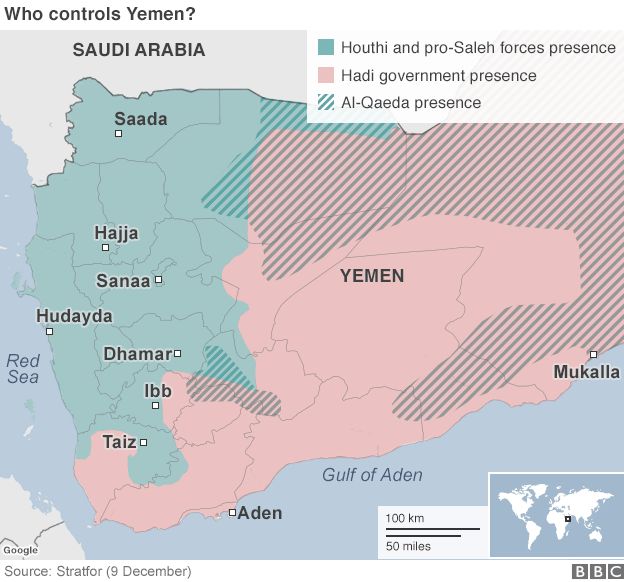...At about 9:30am, the familiar roar of Saudi-led coalition jets was heard overhead. Some people fled as the planes approached, fearing an attack, but many women and children remained inside. Bombs started falling shortly after 10am, the first striking near where the men had gathered. The structure, held up by tree branches and covered with a tarp, was obliterated minutes later. Mosaibas was nearby, but survived the attack; his bride, Hanen Makhrama, had not arrived yet from her nearby village.
...
Initial reports put the death toll as high as 130, citing local health officials. Human rights workers and locals later clarified that at least several dozen people died, most likely between 30 and 50 people. Many of the bodies were too badly burned or mangled to identify immediately or at all. Because a large number of the wedding guests came from outside the town and others fled before and after the attack, those who survived did not know how many people were present when the bombs exploded.
...
The Houthis and allied forces loyal to former President Ali Abdullah Saleh have been implicated in the deaths of hundreds of non-combatants, often killed by indiscriminate and retaliatory shelling or mines left behind as the Houthis retreat. But the UN says that airstrikes have killed the majority of civilians. The United States military has assisted this Saudi-led campaign with logistical support and billions of dollars in equipment and weaponry.
...
Since October 2010, the US has sold Saudi Arabia more than $90 billion in aircraft, defense systems, bombs, missiles, and other weapons. When war broke out in Yemen, it began to expedite shipments. American arms manufacturers have also sold billions of dollars' worth of material to other Gulf coalition members, including the United Arab Emirates and Qatar. Both the Saudis and UAE have purchased controversial cluster munitions — banned by more than 100 countries — that have been used in the current conflict.
Since the airstrikes started on March 25, the US has provided the coalition with vital air-refueling sorties, search-and-rescue support, and help with logistics and intelligence — the centerpiece of which is a Saudi-based "Joint Combined Planning Cell" staffed with American personnel who interact daily with the Saudi military. This support involves what the US military's Central Command (CENTCOM) terms "targeting assistance."
"The Saudi-led coalition is equipped with state-of-the-art weapons and targeting technology, yet airstrikes have caused a tremendous number of civilian casualties," said Claire Talon, Middle East and North Africa director at the International Federation for Human Rights. "It is clear that states providing intelligence and assistance to the coalition, including the US, may be accused of complicity in war crimes."
...
"Without US in-air refueling, combat search-and-rescue, a steady and expedited flow of weapons and ammunition, and contractor logistical support, the air campaign couldn't happen," said Micah Zenko, a senior fellow at the Council on Foreign Relations who has been closely studying the intervention.
...
Jenks, who helped train the Yemeni army during Saleh's presidency, said coalitions like the one operating in Yemen are constructed in a way that protects members and countries like the US, which occupy a sort of grey area.
"The White House may well be able to claim that the US is not making targeting decisions or launching airstrikes, and that it doesn't control the military forces of other countries which are — so as a matter of law, the US is not obligated to conduct an investigation into allegations of civilian casualties," he said. "It seems now that there is a tendency within coalition operations to not acknowledge which countries in the coalition are taking what action. Coalition operations are providing an effective way to deflect media inquiries and concerns about civilian casualties."
...
The Saudi-led coalition claims that the Houthis are a proxy for Iran, and accuse Tehran of supporting the rebels. The extent of Iran's backing is disputed, and support from forces loyal to Saleh, armed with his weapons stockpiles — including arms supplied by the US — have played an outsized role in the rebels' advances. Still, in Washington, the fight in Yemen is often considered a proxy war between Iran and Saudi Arabia.
A Yemen-based human rights official said that the US is driven to provide support in order to placate the Saudis after their opposition to the nuclear deal that the US and other world powers reached with Tehran this summer.
"It comes down to the Iran nuclear deal, and this is the price to be paid, the pound of flesh," said the official, who spoke to VICE News on condition of anonymity due to the official's ongoing work in the country. "
The Saudis get to do whatever they want to do in Yemen."
...











Bookmarks